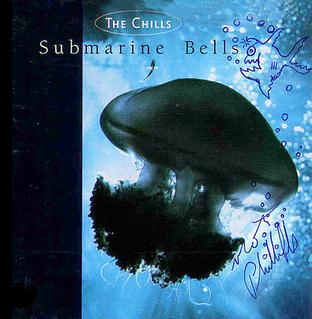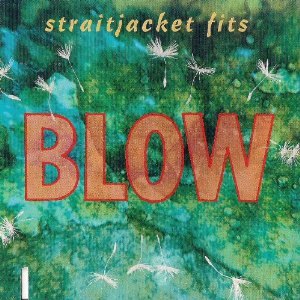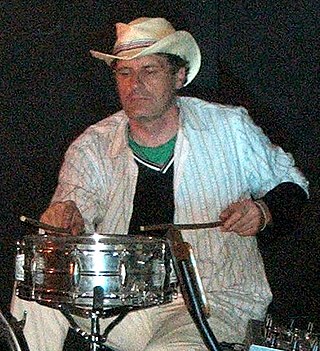Flying Nun Records is a New Zealand independent record label formed in Christchurch in 1981 by music store manager Roger Shepherd. Described by The Guardian as "one of the world's great independent labels", Flying Nun is notable for bringing global attention to the Dunedin sound, a cultural and musical movement in early 1980s Dunedin, which gave rise to modern indie rock.
The Dunedin sound was a musical and cultural movement and a genre of indie pop and alternative rock, created and pioneered in Dunedin, Otago, in the early 1980s. The Dunedin sound is considered to have been a key factor in the origination of indie rock as a genre. The scene was closely associated with Flying Nun Records, an independent label which has become one of the world's most renowned.
The Verlaines are a New Zealand rock band from Dunedin. Formed in 1981 by Graeme Downes, Craig Easton, Anita Pillai, Phillip Higham and Greg Kerr, the band went through multiple line-ups.
Sneaky Feelings are a New Zealand pop rock band which releases on the Flying Nun Records music label. The band formed in 1980 with the line-up of Matthew Bannister, David Pine, Kat Tyrie and Martin Durrant. Tyrie was replaced by John Kelcher in 1984. Durrant was temporarily replaced by Ross Burge in 1988 for the band's second tour of Europe.
Rock music in New Zealand, also known as Kiwi rock music and New Zealand rock music, rose to prominence first in 1955 with Johnny Cooper's cover version of Bill Haley's hit song "Rock Around the Clock". This was followed by Johnny Devlin, sometimes nicknamed New Zealand's Elvis Presley, and his cover of "Lawdy Miss Clawdy". The 1960s saw Max Merritt and the Meteors and Ray Columbus & the Invaders achieve success. In the 1970s and early 1980s the innovative Split Enz had success internationally as well as nationally, with member Neil Finn later continuing with Crowded House. Other influential bands in the 1970s were Th' Dudes, Dragon and Hello Sailor. The early 1980s saw the development of the indie rock "Dunedin sound", typified by Dunedin bands such as The Clean, Straitjacket Fits and The Chills, recorded by the Flying Nun record label of Christchurch. New Zealand's foremost hard rock band Shihad started their long career in 1988. Since 2018 this title is now undoubtedly held by New Zealand Māori metal band Alien Weaponry who have achieved huge success in Europe and the USA.

The Clean was a New Zealand indie rock band that formed in Dunedin in 1978. They have been described as the most influential band to come from the Flying Nun label, which recorded many artists associated with the "Dunedin sound".
Shayne P. Carter is a New Zealand musician best known for leading Straitjacket Fits from 1986 to 1994, and as the only permanent member of Dimmer (1995–2012).

Straitjacket Fits formed in Dunedin, New Zealand in 1986 and were a prominent band in the Flying Nun label's second wave of the Dunedin sound.
Able Tasmans were an indie pop band from Auckland, New Zealand, initially formed as a duo in 1983. They released four albums and two EPs on Flying Nun Records before splitting up in 1996.
The Stones were a New Zealand band from Dunedin named after the Rolling Stones. One of the earliest bands to record on the Flying Nun label, they helped form the style of music known as the Dunedin sound, along with label mates such as the Chills, the Verlaines and Sneaky Feelings, all of whom appeared alongside the Stones on the seminal Flying Nun release the Dunedin Double EP.

Dimmer was the name under which New Zealand musician Shayne Carter recorded and played music from 1994. It began as an umbrella name for jam sessions and short-lived band line-ups, then home recordings, then an ensemble with various members and guests. This evolution led to more settled four-piece rock band. At least 41 musicians have been acknowledged as playing a part in Dimmer over 18 years, with Carter the only permanent fixture.
Andrew Mark Brough was a singer, songwriter and guitarist from Dunedin, New Zealand. Best known for his work with the Straitjacket Fits, he later led the band Bike. In 1996 he was shortlisted for the APRA Silver Scroll and in 2008 he was inducted into the New Zealand Music Hall of Fame.
The DoubleHappys were a New Zealand rock band based in Dunedin who short-lived but influential, and part of the Dunedin sound music wave of the 1980s.

Hey Spinner! is an album by New Zealand band Able Tasmans. It was released in 1990.

Submarine Bells is an album by New Zealand group the Chills, released in 1990. This was the band's first album on a major label, as Martin Phillipps signed to Warner Bros. Records subsidiary Slash Records, to release the album in the U.S. The album reached #1 on the New Zealand album charts and had significant support from American college radio. The album was awarded gold status in New Zealand and represents the peak of the Chills' popularity at home. It is considered to be one of the defining albums of the Dunedin sound. The supporting tour for Submarine Bells culminated in a triumphant home-coming concert in Dunedin Town Hall.

Hail is the first LP album released in 1988 by New Zealand band, Straitjacket Fits. There were three releases of the album, a New Zealand release in 1988, a United Kingdom and United States release also in 1988 and an extended album in 1989. The UK/US release featured tracks which had earlier been released in New Zealand on the Life in One Chord EP; the 1989 release contained all the songs from both the New Zealand album and the earlier EP.

Blow is the third album released in 1993 by New Zealand band, Straitjacket Fits. The album has a harder, less melodic sound than the band's previous albums. This reflects the change of line-up, with Andrew Brough having left the band prior to this album's recording, to be replaced by Mark Petersen. It also reflect's the band's change of recording method and a change of producer. The album was described by one contemporary reviewer as "...twisted rhythms, see-sawing guitars, and brash intensity... Straitjacket Fits at their least user-friendly and most challenging."
Life in One Chord is an EP by New Zealand band Straitjacket Fits, released in 1987. It was the band's debut release. All of the tracks from the EP were included as part of an extended version of their first full album, Hail. The songs are credited to Shayne Carter/Straitjacket Fits except for "Sparkle That Shines". "Sparkle That Shines" was released as a single in 1989.

Hamish Kilgour was a New Zealand musician who co-founded the indie rock band The Clean with his brother David in 1978. Kilgour also co-founded the band Bailter Space in 1987 and later recorded as a solo artist.

The Size Of Food is an album by New Zealand band Jean-Paul Sartre Experience, released in 1989. It was released via Flying Nun Records.









